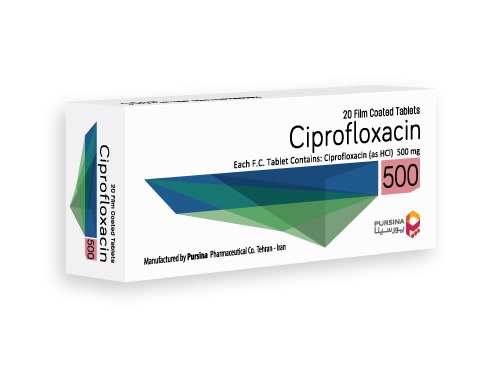Description
How Supplied:
Ciprofloxacin (as HCL) F.C. tablets are presented as forms containing 500 mg Ciprofloxacin; Every 10 tablets are packed in a blister and also every 10 blisters with a leaflet are packed in a box.
Category:
Antibacterial
Administration
- Take with full glass of water.
- Continue medicine for full time of treatment.
- May cause drowsiness, dizziness or lightheadedness
- Take Ciprofloxacin at least 2 hours before or 6 hours after Antacids containing Magnesium or Aluminum, as well as Sucralfate, metal cations such as Iron, Multivitamin preparation with Zinc, or Didanosine or the pediatric powder for oral solution.
Dosage
Usual adult dose:
- Anthrax, inhalational
Oral, 500 mg (base) every 12 hours for 60 days.
- Bone and joint infection
Mild or moderate: oral, 500 mg (base) every 12 hours for at least 4 to 6 weeks.
Sever or complicated: oral, 750 mg (base) every 12 hours for at least 4 to 6 weeks.
- Diarrhea, infectious
Mild to severe: oral, 500 mg (base) every 12 hours for 5 to7 days.
- Gonorrhea, endocervical and urethral
Oral, 250 mg (base) as a single dose.
- Intra-abdominal infection:
Oral, 500 mg (base) every 12 hours for 7 to 14 days in combination with Metronidazole.
- Lower respiratory tract infection:
Mild to moderate: oral, 500 mg (base) every 12 hours for 7 to 14 days.
Sever or complicated: oral,750 mg (base) every 12 hours for 7 to 14 days.
- Meningococcal carriers: oral, 750 mg (base) as a single dose.
- Prostatitis, chronic: mild to moderate: oral, 500 mg (base) every 12 hours for 28 days.
- Sinusitis, or Typhoid fever: oral, 500 mg (base) every 12 hours for 10 days.
- Skin and soft issue infections:
Mild to moderate: oral, 500 mg (base) every 12 hours for 7 to 14 days.
Sever or complicated: oral,750 mg (base)every 12 hours for 7 to 14 days.
- Urinary tract infection
Acute uncomplicated: oral, 100 or 250 mg (base) every 12 hours for 3 days.
Mild to moderate: oral, 250 mg (base) every 12 hours for 7 to 14 days.
Sever or complicated: oral, 500 mg (base) every 12 hours for 7 to 14 days.
Note: Adult with impaired renal function:
If creatinine clearance (ml/min)/(ml/sec) 30-50/0.5-0.83: Dose- 250-500mg every 12 hours.
If creatinine clearance (ml/min)/(ml/sec)5-29/0.08-0.48: Dose- 250-500mg every 18 hours.
Hemodialysis or peritoneal dialysis patients: 250-500 mg every 24 hours after dialysis. after dialysis
Usual adult prescription limit: 1.5 grams daily.
Usual Pediatric dose:
Children up to 18 years of age:
- Anthrax, inhalational:
oral, 15 mg/kg of body weight per dose (base), not to exceed 500 mg per dose (Base) every 12 hours for 60 days.
- Pyelonephritis or urinary tract infection: oral, 10 to 20 mg/kg of body weight per dose, not to exceed 750 mg per dose, administered every 12 hours. Total duration of administration is to 10 to 21 days.
- Cystic fibrosis, pulmonary exacerbations
For children 14 to 28 kg of body weight: Oral, 28 to 20 (base) mg/kg of body weight every 12 hours, up to 2 grams per day.
For children 28 to 42 kg of body weight: oral, 20 to 15 (base) mg/kg of body weight every 12 hours up to 2 grams per day.
- For other infections: oral, 10 to 15 (base) mg/kg of body weight twice a day, up to 1.5 gr per day.
Adverse reaction:
Like all medicines, Ciprofloxacin can cause side effects although not everyone gets them.
Those indicating need for medical attention:
- Previous allergic reaction or hypersensitivity to Fluoroquinolones or other chemically related Quinolone derivatives.
- Photosensitivity and phototoxic reactions
- Tendinitis or tendon rupture
- QTc-interval prolongation
- Chest pain; hypertension
- Peripheral edema.
Those indicating need for medical attention only if they continue or are bothersome:
CNS toxicity, vaginitis, abdominal pain, allergic reaction, anorexia, amblyopia, anxiety; arthoursitis; back pain; change in sense of taste; constipation; depression; dizziness; dry mouth; dyspepsia; dysuria; emotional lability; flatulence; gastritis; headache; insomnia; leg pain; malaise; moniliasis, oral; moniliasis, vaginal; myalgia nervousness; pain; paresthesia; parasomnia; pelvic pain; photosensitivity; pruritus; purpuric rash; pustular rash; sleep disorder; speech disorder; sweating; taste loss or perversion; abnormal thinking; tinnitus; tongue discoloration; vertigo; vision, abnormal; vomiting.
Those indicating possible phototoxicity,pseudomembranous colitis or tendinitis or tendon rupture and the need for medical attention if they occure after medication is discontinued:
Abdominal or stomach cramps and pain, severe; abdominal tenderness; blisters; diarrhea; watery and sever, which may also be bloody; fever; pain in calves, radiating to heels; sensation of skin burning; skin rash; itching or redness; swelling of calves or lower legs.
Precautions:
- If you accidentally consume more than the recommended amount, immediately consult a doctor or medical center.
- Take Ciprofloxacin at least 2 hours before or 6 hours after Antacids containing Magnesium or Aluminum, as well as Sucralfate, metal cations such as Iron, Multivitamin preparation with Zinc, or Didanosine or the pediatric powder for oral solution.
- Possible photo toxicity or photosensitivity reaction. Discontinuing medicine at the first sign of skin rash or allergic reaction; Checking with physician to determine if further treatment is needed.
- Avoid exposure to direct or indirect sunlight during treatment and for 5 days after treatment.
- Avoiding concurrent use of antiarrhythmic agent agents.
- Discontinuing medication and notifying physician if pain, inflammation, rupture of tendon is experienced.
- Discontinuing medication and notifying physician symptoms of peripheral neuropathies including pain, burning, tingling, numbness and weakness develop.
- Discontinuing medication and notifying physician if a diabetic patient has a hypoglycemic episode.
Drug interactions
Inform your doctor if you are any of the following medications: Alkalizers, urinary, such as: Sodium bicarbonate and Carbonic anhydrase inhibitors and Citrates, Aminophylline, Oxtriphylline, Theophylline, Amiodarone, Antidepressants tricyclic, Astemizole, Bepredil, Cisapride, Disopyramide, Erythromycin, pentamidine, phenothiazines, Procainamide, Quinidine, Sotalol, Terfenadine, Antacids, Aluminum, Calcium, magnesium-containing, Didanosine, Ferrous sulfate, Laxatives, Zinc, Sucralfate, Anticonvulsant, Hydantoin, Phenytoin, Antidiabetic agents, sulfonylurea like Glyburide or Insulin, Anti-inflammatory drugs, nonsteroidal (NSAIDs), Bismuth, Caffeine, Theobromine, Corticosteroids, Cyclosporine, Digoxin, Nitrofurantoin, Probenecid, Warfarin.
Pregnancy and Breastfeeding:
Ciprofloxacin is not recommended during pregnancy. If you’re trying to get pregnant or you’re already pregnant, talk to your doctor about taking Ciprofloxacin.
Ciprofloxacin is not generally recommended during breastfeeding and other medicines might be preferred.
Storage
Store below 30˚C. Protect from Light and moisture. keep out of reach of children .
Manufactured by Pursina Pharmaceutical Co.
Tehran-Iran


